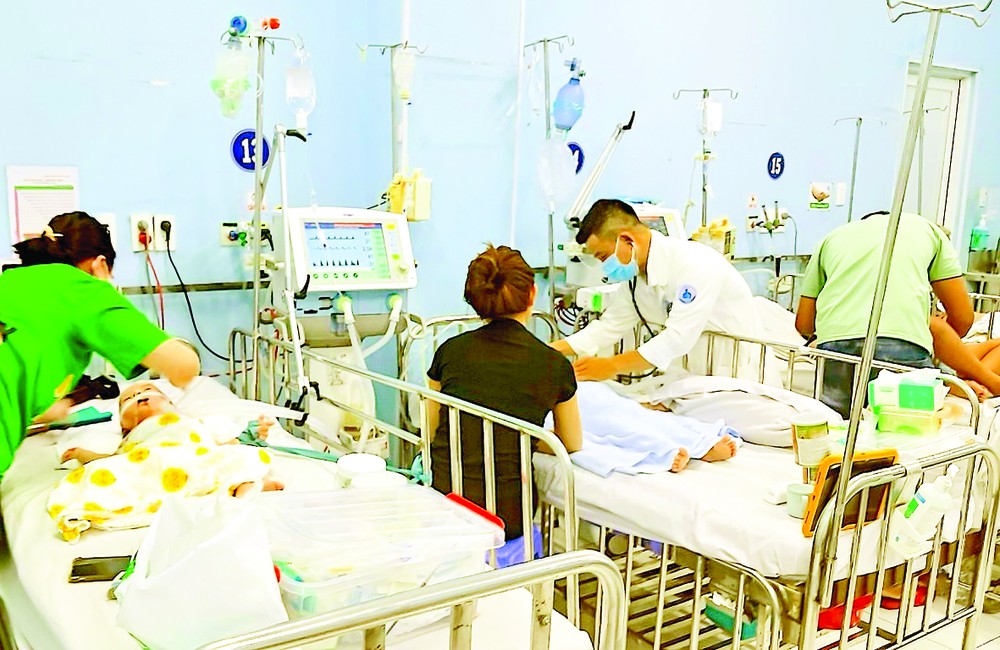
Bad consequences of interruptions in vaccination
Due to the lack of vaccines and uncomfortable weather, many diseases such as whooping cough, measles, rubella, and syncytial virus are increasing. Along with that, zoonotic diseases that are transmitted between species from animals to humans, especially rabies and influenza A/H5N1, are also having complicated developments.
The Outpatient Department of Children's Hospital 2 in Ho Chi Minh City in recent days has always been overloaded with adults who take their children to the hospital for examination. According to Dr. Dang Nhat, on average, the hospital's outpatient department each day receives 30-50 children, an increase of nearly 10 percent compared to February.
Moreover, the hospital’s Infectious Diseases Department alone currently has over 20 baby inpatients who are suffering from infectious diseases; particularly, some of them have dengue fever, hand, foot and mouth disease, typhoid, chickenpox, and whooping cough.
Meanwhile, some 30 children are being treated at the Department of Infectious Diseases and Neurology of Children's Hospital 1 in Ho Chi Minh City. Ten of them are serious cases who are being monitored in the emergency room.
Dr. Du Tuan Quy, Head of the Department of Infectious Diseases - Neurology, Children's Hospital 1, said that from the beginning of March until now, the rate of child inpatients with infectious diseases at the Department increased by about 5 percent compared to the previous month. Worse, vaccination interruptions have also led to an increase in the number of children contracting measles and rubella.
Statistics from the National Institute of Hygiene and Epidemiology under the Ministry of Health showed that in the past 3 months, northern provinces and cities recorded 78 cases of typhus suspected of measles and 10 cases of rubella.
According to the World Health Organization's warning, as per the circle of every 4-5 years, measles will make a comeback in 2024; so outbreaks of measles are highly likely to occur this year. Measles is an infectious disease with a rapid spread rate of 90 percent -100 percent. That means up to 90 percent of people who have not been vaccinated or have never had the disease will become infected if they are close to measles patients. One measles patient can infect 20 other healthy people.
According to statistics from the National Infectious Disease Surveillance System, from the beginning of 2024 until now, the country has recorded about 70 cases of whooping cough, mainly in some provinces and cities in the Northern region.
Associate Professor Pham Quang Thai, Deputy Head of the National Institute of Hygiene and Epidemiology’s Department of Infectious Disease Control, informed that most cases of whooping cough have not been vaccinated or have not been fully vaccinated.
More than 50 percent of children with severe pertussis got the disease from their mothers and they were infected during the immune gap in the first three months of life. Children who have not been fully vaccinated against pertussis are at highest risk of infection and often develop severe illness.
People should be alert for diseases transmitted by animals
Recently, a number of diseases transmitted from animals to humans, especially rabies and influenza A/H5N1, have been increasing again. According to Director Hoang Minh Duc of the Department of Preventive Medicine under the Ministry of Health, in just the first three months of this year, 16/63 provinces and cities had reported rabies cases in humans including 27 deaths, a surge of 170 percent compared to the same period in 2023. The Central region has the highest number of deaths with 9 lives.
The South has the highest number of people who go to medical facilities for vaccination against rabies in the country, up to 143,000 people. More worryingly, from 2022 up to now, 2 new cases of bird flu have been recorded after more than 8 years. One person in Khanh Hoa Province succumbed to bird flu last March.
Currently, about 200 infectious diseases transmitted from animals to humans in the world have been recorded with many different agents. In the past two decades, many dangerous and emerging epidemics have occurred worldwide, such as plague, SARS, avian influenza A/H5N1, influenza A/H1N1, MERS-CoV, Ebola. The Covid-19 pandemic has recently ravaged the world, causing serious impacts on human health as well as major impacts on the socio-economics of countries. Mr. Hoang Minh Duc said that it is worrying that up to 75 percent of dangerous diseases are transmitted from animals to humans or have genetic origins from animals.
Vietnam has identified five types of diseases that need to be high on the list of priority for prevention. They are highly pathogenic avian influenza, rabies, anthrax, streptococcus swine, and leptospirosis because these are diseases with very high mortality rates in humans (even up to 100 percent). These diseases also have expensive treatment and prevention costs.
Mr. Hoang Minh Duc commented in addition to the health sector’s responsibility, fighting these above-mentioned diseases needs related ministries and agencies such as the agriculture and rural development, industry and trade, local authoritiesb to join hands and the proactive participation of people and communities to thoroughly resolve infectious diseases for the protection of people's health.
























